- By Dan Veaner
- Around Town
 Print
Print
The dining hall at Fire Station #4 was full Saturday as neighbors gathered to learn how seismic exploration in North Lansing will affect them. Ansboro Petroleum treated the group to lunch and information about their search for natural gas in the area. Representatives from Ansbro and several local sub-contractors were on hand to answer questions about the process of finding and drilling for natural gas. "We're delighted to have such a good turnout," said Ansbro Executive Vice President and Chief Operating Officer Margot Timbel. "We're delighted with our contractors being able to speak with the people who are in this neighborhood and affected by this project."
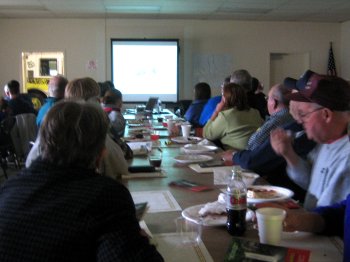
The company paid for Connie Wilcox to provide lunch for the event. Wilcox is often seen in the firehouse kitchen during North Lansing Auxiliary meals when the group raises money for a variety of good causes. As the 100th place setting was taken from a basket on the food line, she estimated that about 80 residents attended the event, with the remaining meals going to company representatives.
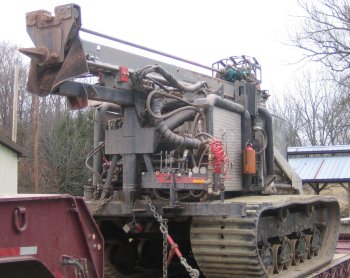
This portable track mounted shot hole drill rig was on
display outside the firehouse
Ansbro is a Denver-based family owned company that is looking for new reserves of oil and natural gas in the United States. They lease exploration rights from local landowners, and if oil or natural gas is found and extracted, profits are shared. Locally the company has been active in Tompkins, Chemung, Cayuga, and Cortland Counties. The nearest well is just over the border in Genoa, on the Patchen family's Elkendale Farm.
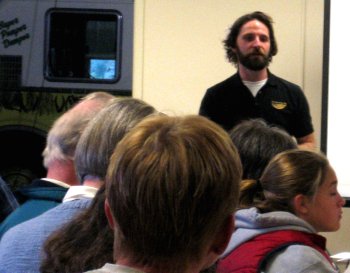
Keith Uruski gives a presentation that explains the
exploration process and what residents might expect
Residents crowded into the firehouse to view a presentation given by Geophysical Applications' Keith Uruski. He described the equipment that will be used over the next month, and the impact residents could expect. The Elmira-based company specializes in seismic exploration, collecting the raw data on-site for Ansbro to evaluate as they decide where to place wells. "They hire us to help increase their chances of having a successful well," Uruski says. "We limit the chance of drilling a dry hole."
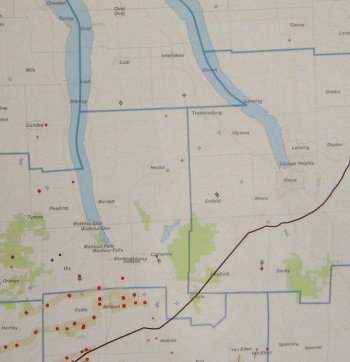
The red dots represent wells. So far there is one in our area,
in Genoa just north of the Lansing border
With the parent company in Canada, Uruski says the company is also active in southern Ontario and Quebec. "But New York and Pennsylvania is where we've been basing our operations," he says. "The Southern Tier has been a real big hot spot lately."
Part of the exploration process involves digging holes in which charges are set off. Ansbro has contracted with F.T. Well Support from Campbell, NY near Corning to prepare that part of the job. "We work for several companies," says owner Michael Comstock. "We'll be doing the drilling for the dynamite and we have the slashing crews -- if they have a wooded area where they have to make a trail, my guys come in and make it." Comstock says he has worked for some of the large petroleum companies in the Arctic Circle, but he is impressed with Ansbro. "These guys are a class act. People will be pleased with this company."
Of course landowners hope that the company will find oil or gas on their land. The New York State Department of Environmental Conservation (for details visit the NYSDEC Web site) issues well permits to 320 acre areas called 'spacing units.' More than one landowner may be included in a spacing unit, and if gas or oil is pumped out, the owners are paid in proportion to the amount of land they own in that unit. Modern wells are able to drill horizontally as well as vertically, so a single well is permitted to drill within the limits of its spacing unit, a more environmentally and economically friendly approach than placing multiple wells.
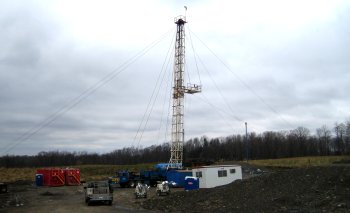
This well is on Elkendale Farm, just a stone's throw from Lansing
16 landowners participate in the spacing unit covered by the well on the Patchen farm. "They went straight down along the curve to East Genoa, about 3000 feet north of us," says Ken Patchen. The well is on a plot next to his daughter's house, and a bit down and across the street from his own home. The company will restore the land, mostly fields, when they are finished drilling.
Patchen says he has had a good experience with the company, and that there hasn't been much inconvenience. "It was just a little background noise to us," he says. "We run a dairy farm, so we have noise all around us all the time anyway. There would be some sharp clanging when the pulled the rod out of the hole, which they did twice a week." Patchen doesn't know how much gas production to expect from the well. "They say if you see a gas flare lit for any length of time then that's a good sign," he says. "So far we haven't seen that flare yet." He says he is not planning his retirement yet based on the well.

But the potential is there for Lansing residents to share in Ansbro's good fortune if the resources are found. The company says they will be conducting the exploration through December, and will decide whether to place wells in North Lansing based on the information they gather.
----
v2i45

The company paid for Connie Wilcox to provide lunch for the event. Wilcox is often seen in the firehouse kitchen during North Lansing Auxiliary meals when the group raises money for a variety of good causes. As the 100th place setting was taken from a basket on the food line, she estimated that about 80 residents attended the event, with the remaining meals going to company representatives.

This portable track mounted shot hole drill rig was on
display outside the firehouse
Ansbro is a Denver-based family owned company that is looking for new reserves of oil and natural gas in the United States. They lease exploration rights from local landowners, and if oil or natural gas is found and extracted, profits are shared. Locally the company has been active in Tompkins, Chemung, Cayuga, and Cortland Counties. The nearest well is just over the border in Genoa, on the Patchen family's Elkendale Farm.

Keith Uruski gives a presentation that explains the
exploration process and what residents might expect
Residents crowded into the firehouse to view a presentation given by Geophysical Applications' Keith Uruski. He described the equipment that will be used over the next month, and the impact residents could expect. The Elmira-based company specializes in seismic exploration, collecting the raw data on-site for Ansbro to evaluate as they decide where to place wells. "They hire us to help increase their chances of having a successful well," Uruski says. "We limit the chance of drilling a dry hole."

The red dots represent wells. So far there is one in our area,
in Genoa just north of the Lansing border
With the parent company in Canada, Uruski says the company is also active in southern Ontario and Quebec. "But New York and Pennsylvania is where we've been basing our operations," he says. "The Southern Tier has been a real big hot spot lately."
Part of the exploration process involves digging holes in which charges are set off. Ansbro has contracted with F.T. Well Support from Campbell, NY near Corning to prepare that part of the job. "We work for several companies," says owner Michael Comstock. "We'll be doing the drilling for the dynamite and we have the slashing crews -- if they have a wooded area where they have to make a trail, my guys come in and make it." Comstock says he has worked for some of the large petroleum companies in the Arctic Circle, but he is impressed with Ansbro. "These guys are a class act. People will be pleased with this company."
Of course landowners hope that the company will find oil or gas on their land. The New York State Department of Environmental Conservation (for details visit the NYSDEC Web site) issues well permits to 320 acre areas called 'spacing units.' More than one landowner may be included in a spacing unit, and if gas or oil is pumped out, the owners are paid in proportion to the amount of land they own in that unit. Modern wells are able to drill horizontally as well as vertically, so a single well is permitted to drill within the limits of its spacing unit, a more environmentally and economically friendly approach than placing multiple wells.

This well is on Elkendale Farm, just a stone's throw from Lansing
16 landowners participate in the spacing unit covered by the well on the Patchen farm. "They went straight down along the curve to East Genoa, about 3000 feet north of us," says Ken Patchen. The well is on a plot next to his daughter's house, and a bit down and across the street from his own home. The company will restore the land, mostly fields, when they are finished drilling.
Patchen says he has had a good experience with the company, and that there hasn't been much inconvenience. "It was just a little background noise to us," he says. "We run a dairy farm, so we have noise all around us all the time anyway. There would be some sharp clanging when the pulled the rod out of the hole, which they did twice a week." Patchen doesn't know how much gas production to expect from the well. "They say if you see a gas flare lit for any length of time then that's a good sign," he says. "So far we haven't seen that flare yet." He says he is not planning his retirement yet based on the well.

But the potential is there for Lansing residents to share in Ansbro's good fortune if the resources are found. The company says they will be conducting the exploration through December, and will decide whether to place wells in North Lansing based on the information they gather.
----
v2i45



